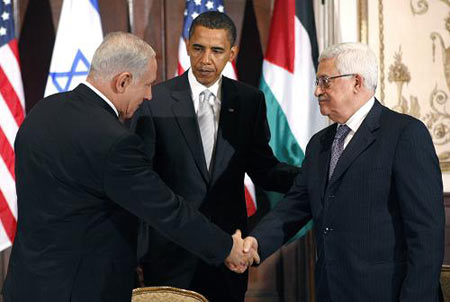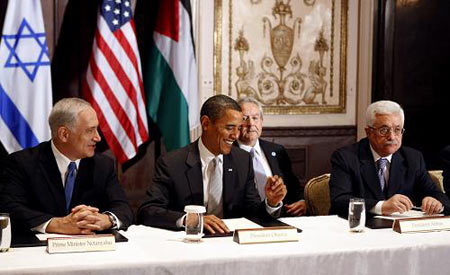US President Barack Obama on Tuesday managed to get Israeli Prime Minister Benjamin Netanyahu and Palestinian leader Mahmoud Abbas to shake hands and sit down together for talks with him on the sidelines of the U.N. General Assembly annual general debate.
 |
|
US President Barack Obama watches Israeli Prime Minister Benjamin Netanyahu (L) and Palestinian President Mahmoud Abbas (R) shake hands during a trilateral meeting in New York September 22, 2009. [Xinhua] |
They agreed to work toward resuming negotiations on the peace in the Middle East.
But that was about the extent of progress to report, other than envoys from Israel and the Palestinians were to meet again next week in Washington with former Sen. George Mitchell, the Middle East special envoy. Another trilateral session is planned for October with US Secretary of State Hillary Clinton.
Mitchell said it was the first such meeting at the head of state or government level in almost a year.
"We have to summon the will to break the deadlock that has trapped generations of Israelis and Palestinians in an endless cycle of conflict and suffering," Obama told the two leaders at the outset of the trilateral session and following private, individual meetings of about 40 minutes each with the leaders and a handful of their aides.
"We cannot continue the same pattern of taking tentative steps forward and then stepping back," he said. "Success depends on all sides acting with a sense of urgency."
Obama told the two leaders -- it was the first time they shook hands since Netanyahu assuming office in April -- the talks were "the right thing to do .. it is absolutely critical that we get this issue resolved."
The goal is two states in which both the Israeli people and the Palestinian people can live in peace and security.
Obama, citing some recent progress said it was not enough.
"Palestinians have strengthened their efforts on security, but they need to do more to stop incitement and to move forward with negotiations," he said. "Israelis have facilitated greater freedom of movement for the Palestinians and have discussed important steps to restrain settlement activity."
 |
|
US President Barack Obama (C) sits with Palestinian President Mahmoud Abbas (R) and Israeli Prime Minister Benjamin Netanyahu during a trilateral meeting at President Obama's hotel in New York September 22, 2009. [Xinhua] |
Then the US president showed what may be taken as a flash of impatience.
"Simply put it is past time to talk about starting negotiations-- it is time to move forward," he said. "It is time to show the flexibility and common sense and sense of compromise that's necessary to achieve our goals."
Mitchell, charged with shepherding the Middle East peace process, was sent to brief reporters on the meetings.
He said Israel "has removed some checkpoints and roadblocks and taken other steps to facilitate the greater movement of people and commerce" on the West Bank.
"Steady and substantial improvement in personal security and in economic activity among Palestinians in the West Bank" were among the Palestinian positives.
He described Tuesday's talks as "direct and constructive" with a tone he described as "positive and determined".
Mitchell said Obama told the two leaders, "We cannot restart talks from scratch, that said, neither side should hold out for the perfect formula. Painful compromise by all will be necessary."
The special envoy said the next step was a brief period of discussions to relaunch negotiations.
Mitchell bristled when asked Obama's choice of "restrain" to describe Netanyahu's pressure on Israeli settlers on the West Bankas signaling a change in US policy which has been to seek an end to new settlements.
"There's no change in American policy," he told reporters. "Our position is what it has been throughout. We believe that if the actions that we requested were taken they would create the best opportunity to have a context in which the relaunch of negotiations could succeed."
"We have never said that any one of the actions we requested was a precondition to negotiations and we also never said the actions that we seek were the ends in themselves," Mitchell continued. "We have always made clear that our objective is the relaunch of negotiations and that the actions that we requested were steps that would help create a context favorable to the successful completion of those negotiations."
Harking back to the five years he worked on the Northern Ireland peace process, he said they were so different and difficult he hesitated to draw parallels when it was suggested the US effort has been a failure.
"In a technical sense, if your objective is to get an agreement, you have failed until you get an agreement," he said. "We haven't gotten everything we wanted and we haven't gotten it as fast as we wanted. If we get 100 percent failures then there would never be a success. We are determined to proceed. We are not deterred by descriptions of failure."
(Xinhua News Agency September 23, 2009)